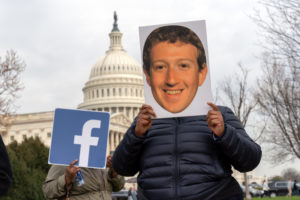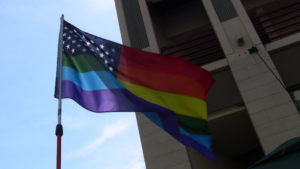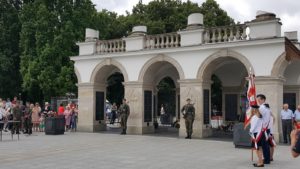Poland invites nationalism in its commemoration of WWII by moving location and inviting Trump
Guest writer Rebecca M. Townsend paints an unsettling context for recent actions surrounding Poland’s 80th annual WWII commemoration.
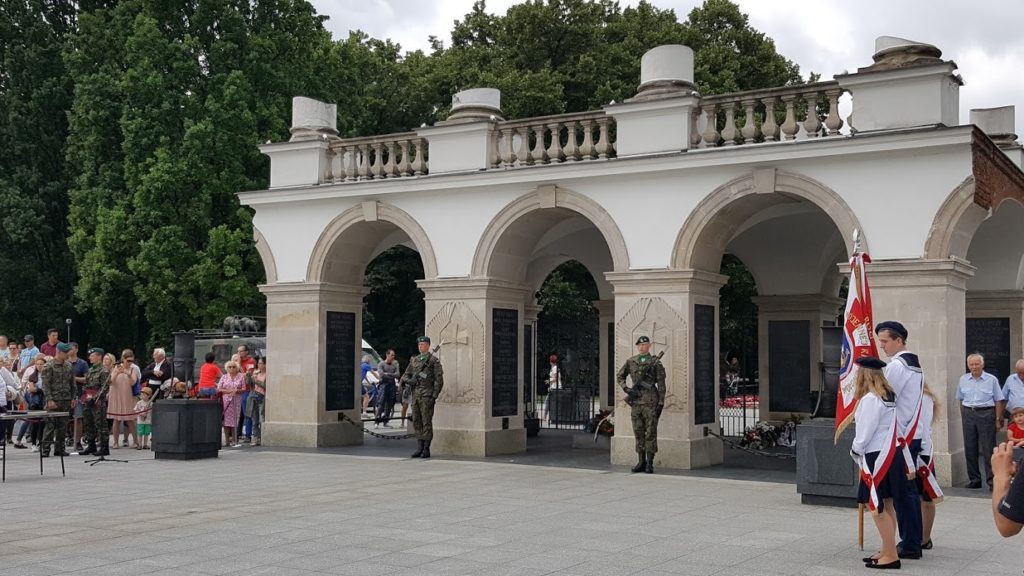
Tomb of the Unknown Soldier in Piłsudski Square, Warsaw. Photo by Rebecca M. Townsend | CC-BY-ND
EDITOR’S NOTE: After this article was written, Donald Trump cancelled his visit to Poland. Mike Pence attended in his stead.
Every year, Poland commemorates where World War II broke out on Sept. 1, 1939: the Baltic Seacoast peninsula of Westerplatte in Gdańsk in the precise spot and time, 4:45 a.m., where German ships opened fire on Poland.
It will be different this year.
For the 80th anniversary, Poland has changed the site of the usual commemoration ceremony from Westerplatte to Warsaw and, for the first time, has invited a U.S. president to speak.
I am often in Warsaw. For the last four summers, I have been in Poland researching the ways Poland commemorates the past, and U.S. presidents’ rhetoric in Poland.
Moving from Gdansk
The city of Gdańsk, where the ceremony was traditionally held, regards itself as a “melting pot.”
The national government is led by the nationalist Law and Justice Party (PiS). PiS is at odds with the policies and rhetoric of Gdańsk’s former and current mayors, Paweł Adamowicz and Aleksandra Dulkiewicz, as part of the PiS effort to shape history.
‘Does Gdańsk want to be part of Germany?’ asks PiS-linked weekly Sieci on a cover featuring the city’s mayor, her murdered predecessor and @donaldtusk alongside Nazi imagery.
It claims the city, an opposition stronghold, is ‘at war with Poland’ and ‘cultivating’ its German roots pic.twitter.com/OsMivlkwcZ
— Notes from Poland 🇵🇱 (@notesfrompoland) June 30, 2019
It seeks to nationalize what had been a locally created and controlled event.
PiS has made Westerplatte a contemporary battleground of memory. Over the last four years, its members have exerted pressure on museums, cultural sites and historians over the ways they present the past.
Gdańsk tells the story of the city’s past in a future-oriented way that marks it as a “European” city.
Mayor Adamowicz, murdered by someone who opposed his former political party on January 14, said during the 2018 ceremony that Westerplatte was where “the Poles first said no to aggression and trampling on human and divine rights.”
He had anticipated that the 80th anniversary would be held in Gdańsk.
But PiS has what I and other critics see as a restrictive and conspiratorial view of the past. Party leaders promote a narrative of Polish heroism, national unity and glory rooted in martyrdom. They reject connection with the rest of Europe.
PiS has complained that Westerplatte has experienced vandalism and litter. They assert Warsaw’s capital city status is the reason for moving the ceremony, or that the Polish soldiers’ bravery was not properly commemorated.
A change in location
This year, without consulting Mayor Dulkiewicz, President Duda announced the WWII commemoration would be at Warsaw’s Piłsudski Square. PiS took land in Westerplatte without discussion on whether to do so; opposition members of Parliament were not allowed to vote on the issue.
Piłsudski Square is named for early 20th-century independence army leader Józef Piłsudski.
Holding the commemoration at the site could draw attention to the illiberal and authoritarian right-wing perspectives, rather than Poland’s European identity. The square abounds with military buildings and symbols. PiS has been bringing nationalists into the mainstream.
Piłsudski Square sprawls. The military-guarded Tomb of the Unknown Soldier borders one end, parallel with trees from the Saxon Garden behind it. High-end stores, luxury hotels and international companies like McKinsey and Noble Bank flank the square.
The tomb looks out onto the white-granite Papal Cross and a pair of statues. One is a statue of Piłsudski.
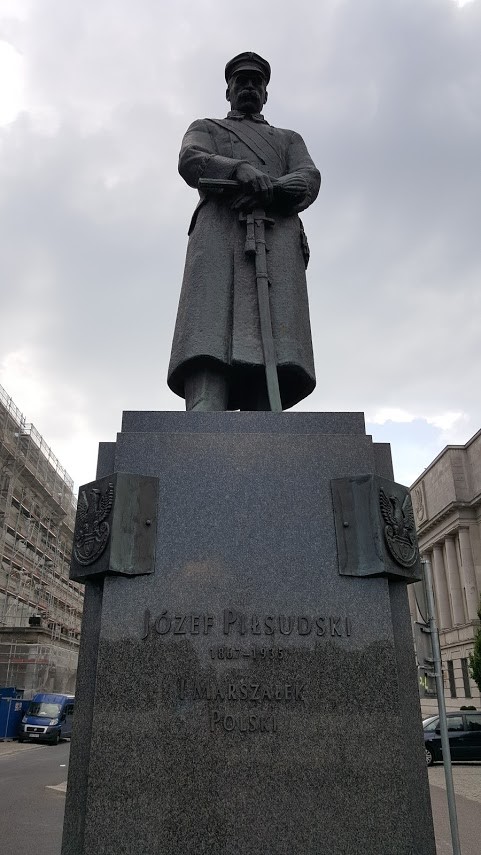
The taller monument is of former Polish President Lech Kaczyński, in front of the Warsaw Garrison Command. To the right is a black stairway to the sky, a monument to the Smolensk Air Disaster, the airplane crash in which Kaczyński died in 2010.
His twin brother, Jarosław Kaczyński, the extremist leader of PiS, was responsible for adding the statue of his brother and of the stairway, and for using memory of historical traumas for political aims.
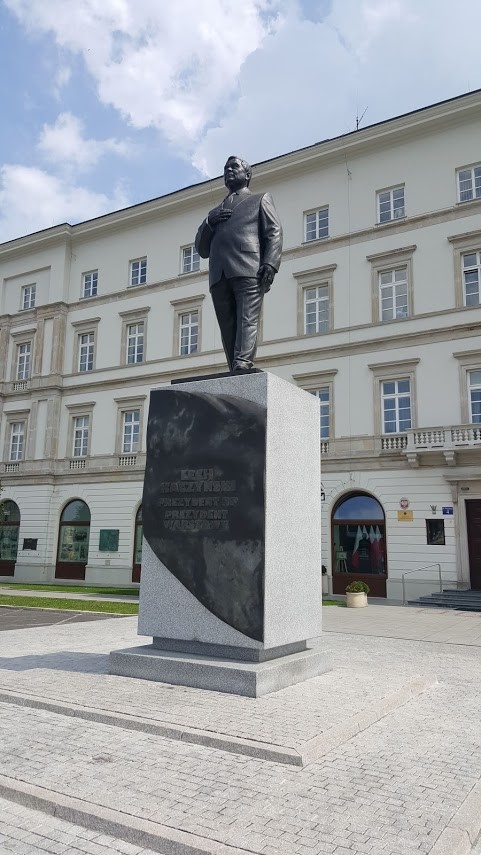
What will Trump say?
Breaking tradition twice, PiS asked President Donald Trump to speak, making him the first U.S. president to address the ceremony.
When Trump spoke in Poland in 2017, he portrayed “the West” as a victim of the evils of others.
He spoke about what he perceives as a clash between “the West” and non-Westerners, saying, “The defense of the West ultimately rests not only on means but also on the will of its people to prevail,” and “The fundamental question of our time is whether the West has the will to survive.” Trump’s rhetoric is often in line with the PiS.
Trump and his audiences
This September, Trump again will address several audiences with different expectations.
The Polish government, desirous of U.S. military support, welcomes nationalism and martyr imagery. Poland’s statues, monuments and buildings combine to create an image of a Poland that has suffered, with Kaczyński as a martyr.
Putin was not invited, but he will likely be listening.
Both Polish and American audiences may expect Trump to address Russian interventions in Poland and Ukraine.
Americans usually expect their presidents to speak of democracy and freedom, yet I think they will hear more of what rhetorician Jennifer R. Mercieca calls “weaponized communication,” the use of communication as an aggressive tool for compliance.
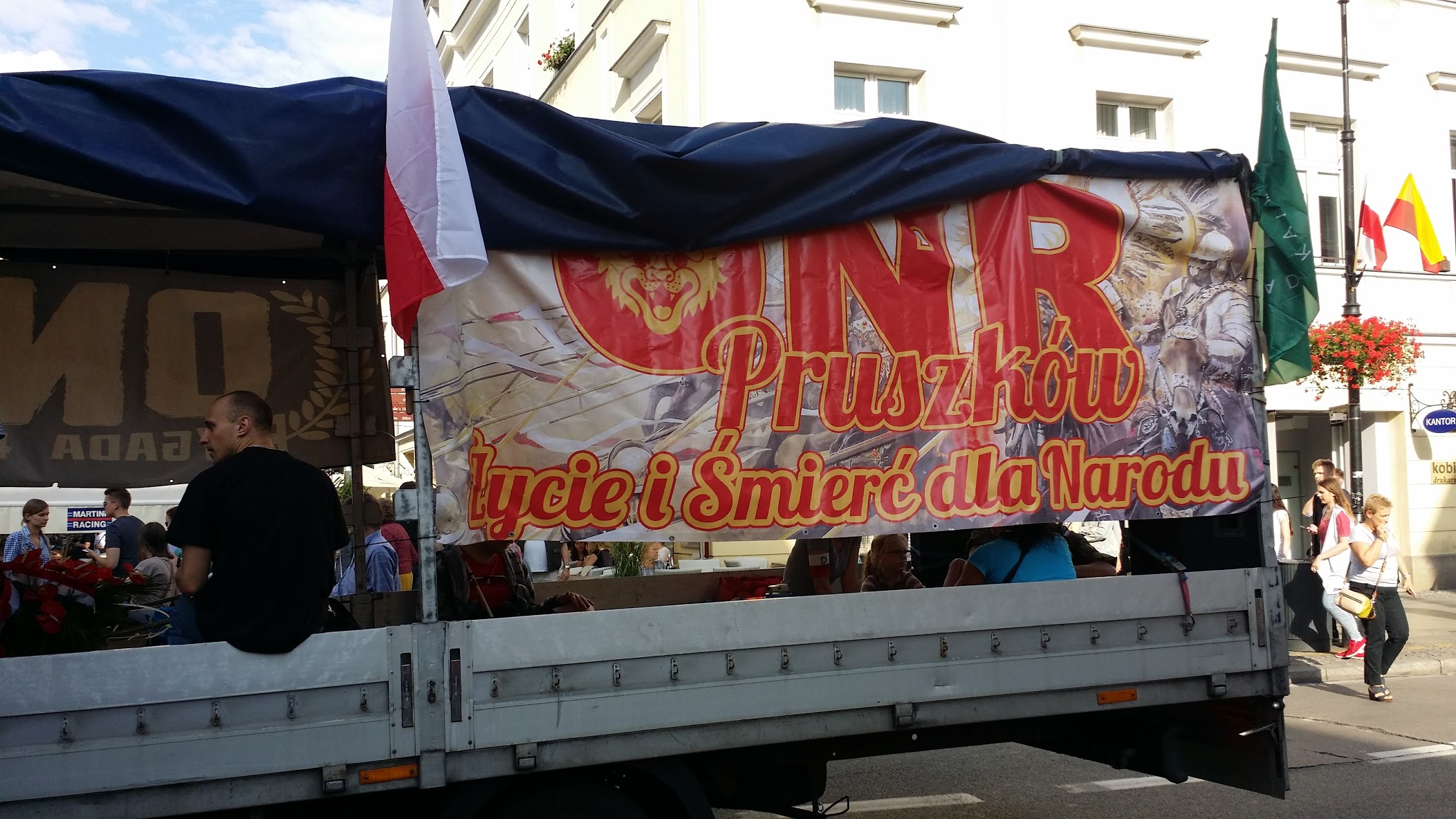
Polish views of Trump
Although Polish people favor U.S. leadership generally, their confidence in Trump’s ability to do the right thing falls sharply below their approval of Barack Obama, who sent 3,500 troops to Poland in early 2017, in a show of defense against Russia. This action met with Putin’s anger, who said of Poland, “It isn’t even a European country.”
Based on his prior rhetoric, I believe Trump will use the setting and stories of Polish victimhood in ways that fuel nationalism, rather than promote the ideals of pluralistic democracy.
His insult to the memory of the Warsaw Uprising on its anniversary creates additional complexity. When a Polish journalist asked him for a message on the 75th anniversary of the Uprising, he responded with self-serving statements about what Poland will do for him.
His rhetoric poses challenges to his administration’s own attempts at diplomacy. Trump is not as popular in Poland as he believes, when he says, “people of Poland like me.”
With this anniversary event, Poland moves public memory from a city which welcomes diversity and tolerance to a largely barren square dotted with symbols of the military and nationalism. By straying from security through solidarity with Europe, this battle over sites of memory contributes to the fracturing that serves Putin’s interests.
This article is republished from The Conversation under a Creative Commons license. Read the original article.

[ You’re smart and curious about the world. So are The Conversation’s authors and editors. You can read them daily by subscribing to their newsletter. ]
![]()

Rebecca M. Townsend
Rebecca M. Townsend is a scholar of rhetoric and culture of communication, often focusing on public memory and public deliberation in government. Her research focuses on the ways culture and rhetoric help shape people’s understandings of contemporary issues, those of the past, and how the ways people talk create boundaries for what is possible in democracy.
She is developing an understanding of uses of the past in Poland, where she frequently teaches graduate courses at the University of Social Sciences in Łódź and Warsaw, in collaboration with Clark University. Her work analyzing Polish views of the Brexit vote was conducted in summer 2016 and published in Intercultural Communication: Adapting to Emerging Global Realities in 2018. She has studied memory sites and developed an analysis of President Trump’s use of the Warsaw Uprising in his first European speech.
At the local level, she studies public engagement in local governance and regional policy creation. Town meetings as sites for local self-governance is one area of research. Regional transportation planning and engagement of people who are traditionally under-heard in policy creation is another area, where she often integrates undergraduate students in research. Her current work develops public engagement in creation of policies on autonomous vehicles.
Dr. Townsend teaches courses in Communication, Persuasion, Public Speaking, Small Group Communication, Ethnic and Intercultural Communication, and Change Management. She is also a consultant and an elected town meeting moderator in her local government.

